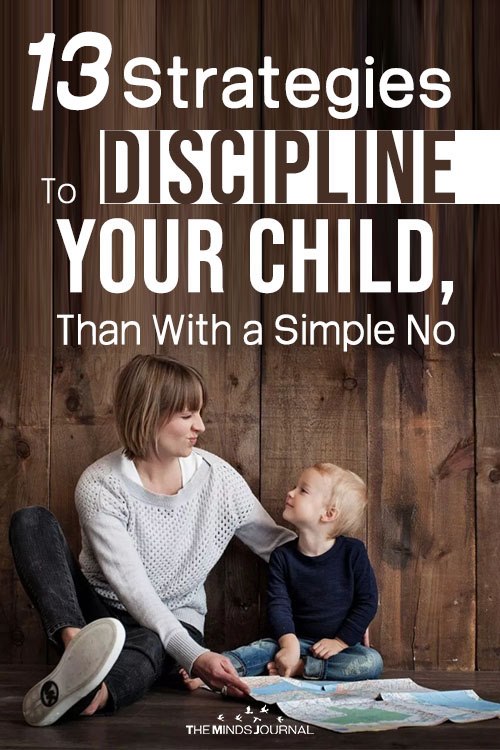‘No’ is not the only thing to say while you discipline your child. Did you know that a child hears “No” a staggering 400 times a day? That’s not just tedious for the parents but can also be very harmful to the kid.
According to experts, kids who listen “no” a lot during childhood have poor language skills as compared to those children whose parents offer more positive feedback and discipline them without saying “No”.
It does not mean that a parent should not guide or discipline the child but they should discipline and teach the child in better and more positive ways.
I have compiled a list of 13 practical steps to teach children qualities of autonomy and initiative, (instead of guilt and shame).
Here you go:
1. Do not demean or disrespect the child
A child may be younger to you but he/she is also an individual and needs to be treated like a precious and valuable individual since childhood so that he/she develops solid self-esteem and self-worth that will help him/her throughout their entire life.
Do not scream or yell or spank your kid, it generates a sense of guilt and shame in the child’s mind.
Instead, treat them as equal and teach them by example.
Children need love, especially when they do not deserve it. – Harold Hulbert
2. Involve your child in decision making
Instead of dictating your child what to do and how to do it, involve them in the process of decision making so that they can learn personal power and autonomy.
Give them choices and ask them what they would like to choose? It could be as simple as choosing between two ice cream flavors or which book to read or which colour to use for drawing?
When the kids are involved in the decision-making process, they will feel empowered and develop the qualities of personal power and autonomy.
Related: 10 Do’s and Don’ts To Keep Your Parenting Healthy and Non-Toxic
3. Be polite when you make requests to them
Be polite and respectful when you ask your child to do something. Don’t ask your child to do something right away and interrupt what they are doing. It will instil a feeling in them that what they are doing is not important and they don’t have a say in choosing what to do with their time. Ask them if they will do this after their work is finished and show them that you are willing to wait till they finish their current occupation.
Even if you think a child is too young to understand completely what you are doing but they do understand that my parent loves me enough to be polite to me and show respect to me. That goes a long way in building positive self-worth and self-esteem of a kid from a young age.
4. Teach them the importance of punctuality and time management
Carry a small timer with you wherever you go.
Teach your child to set it for one or two minutes and tell them to finish a small task within that time duration.
5. Give them a choice in how they would like to help you
You can give them a choice in small tasks and ask them to choose how they would like to help you. For e.g. you can ask them, “Would you like to help me to carry my purse or get me the car keys?” or “What would you like to do when you reach home, read or sleep?”
These small decisions can imbibe the sense of empowerment and autonomy in the child’s mind and develop a sense of independence and confidence that will help them in the long run also.
Related: 11 Of The Most Important Things, Parents of Successful Kids Do
6. Show don’t tell
The best way to get a child to do something is to show them instead of giving lectures or be plainly suggestive.
And for kids who are in the pre-verbal stage, the best strategy to work with them is supervision, distraction and redirection.
If you find them doing something annoying, distract them and then show them what needs to be done by actually doing it yourself.
7. Use your sense of humour
It takes a lot of patience to bring up the kids in a calm and positive manner.
Use your sense of humour to lighten up the mood and stay positive during the tiring and stressful times.
8. Be empathetic when your child goes through painful emotions
A child goes through a lot of emotions like guilt or shame or anger when he is upset and feels like he could not do something well enough.
The way you respond to the child’s emotions in this tender age will set a tone for how they will learn to deal with these painful emotions as an adult.
Therefore, whenever you see your child going through painful emotions, just hold space for them. Hug them or rub their back as they cry and let them go through the entire emotion in a safe and non-judgmental manner before you switch to the next activity.
In this way, a child will grow up with a healthy relationship with all emotions. He will feel safe and know how to deal with these painful emotions in his adulthood instead of suppressing them or acting them out in an extreme manner.
Related: The Dangers of Distracted Parenting: Why Parents Need To Put Down Their Phones
9. Treat children with integrity and be respectful to them
Children are very intuitive and sensitive to energy. They can find out when you say something and don’t mean it. Don’t say something to the child when you don’t mean it, they will find it hard to trust you when you will actually say something that you mean.
Also, make it a point to treat the child with respect and dignity. Childhood is the time when the kid develops his sense of worth and it is mostly based on the quality of love or attention that he gets from his parents.
Children who are truly loved (spent time with) unconsciously know themselves to be valued. This knowledge is worth more than gold, because they can then feel valuable, in the deepest parts of themselves. – M. Scott Peck, Road less travelled.
10. Love is the key to discipline the child
Scott Peck, American psychiatrist and bestselling author of the book “Road less traveled”, published in 1978, stated that love is the key to discipline the kid. It is even more powerful and effective than being a good role model.
If a child sees his parents day in and day out behaving with self-discipline, restraint, dignity and a capacity to order their own lives, then the child will come to feel in the deepest fibres of his being that this is the way to live.
But even more important than role modelling is love. From some chaotic and disordered homes where love is present come self-disciplined children. And sometimes the most strict and ordered homes of professional people, which have not to love, send out children who are destructive, disorganized and undisciplined.
Good discipline requires time, simply so we can know when our disciplinary assistance is needed. Gentle urging, reprimand, structure and praise, administered with thoughtfulness and care, are only possible when the parent knows when to use them.- M.Scott Peck, Road less travelled
11. Create daily routines
Create routines for the daily events that happen over and over again, like breakfast, dinner, shopping etc.
Ask your child to follow the routine and keep on reminding them what’s next and what they are supposed to do according to the routine.
12. Be patient
Empathize that your child is learning so many things at the same time and would ask you a lot of questions and you might have to teach them some things again and again. Be patient with them because they are doing the best they can from their developmental stage.
Minimize your words and teach them by actions.
Also, don’t take your child’s behaviour personally and become defensive or offensive. Be the adult in the situation and do what needs to be done without guilt or shame or anger.
Related: Parenting Challenges In The Digital Age
13. Create a safe and healthy space for kids to develop and learn
Your attitude can provide a safe and non-judgmental space for the kid to learn and develop within appropriate boundaries.
Your job as a parent is to be the coach and guide your kid and help them in their blossoming into fullest potential.
Observe your child and watch carefully where you can introduce new opportunities and activities and what your child takes keen interest in, what your child does well and where he gets stuck and needs your help, then act accordingly.
To teach your child discipline is a part of child-rearing and child-rearing is all about compassion and love. And above all, the parental instinct also plays an important role in it.
If you found the post helpful, let us know in comments.










Leave a Reply
You must be logged in to post a comment.